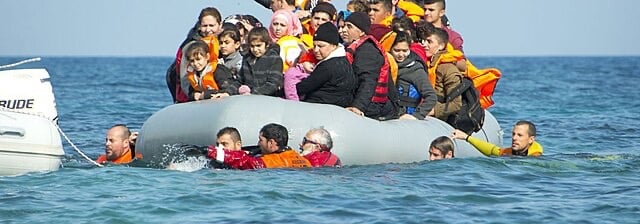Early on May 19, 2025, tragedy struck the waters of the English Channel once again. A small, overloaded boat carrying desperate migrants capsized off the coast of Boulogne-sur-Mer, claiming one life and leaving 62 others in a fight for survival. This event isn’t just another entry in the tally of tragedies—it’s a painful reminder of the human cost of inaction and broken migration systems.
In the face of one of the busiest shipping lanes in the world, migrants continue to risk everything for a chance at safety and dignity. Despite ongoing political debates, this crisis remains heartbreakingly human.
The Fateful Morning in the Channel
The Channel was calm, deceptively so, when the overloaded vessel set out before dawn. Packed with hopeful men, women, and children, the boat was no match for the Channel’s treacherous currents and hidden hazards.
At approximately 3:45 AM, distress calls began to surface, triggering a rapid response from maritime rescue teams in both France and the UK. The boat had taken on water and eventually capsized, tossing its occupants into the frigid sea. A coordinated operation involving French and British rescue teams quickly unfolded, with lifeboats and helicopters dispatched to the scene.
The tragedy, though not uncommon, sent a chilling ripple across both nations as authorities scrambled to manage the crisis and investigate how yet another crossing had ended in disaster.
Heroic Rescue Efforts
As soon as the alarm was raised, emergency services sprang into action. The French tugboat Abeille Normandie played a central role, recovering 50 individuals directly from the cold waters. Meanwhile, UK Border Force vessel Ranger rescued nine more, and the RNLI pulled out two migrants—one of whom was unconscious.
Each minute counted as the teams worked under pressure. Their efforts saved dozens of lives, showcasing both the coordination between nations and the incredible dedication of rescue personnel.
But even in the face of success, the shadow of tragedy loomed—a grim reminder that no amount of preparedness can fully prevent such outcomes.
A Life Lost in Search of Hope
One life was lost during this ordeal—an unidentified individual, believed to be a young man, was pulled unconscious from the water. Despite intense resuscitation efforts by RNLI crews and medical staff aboard Abeille Normandie, he was declared dead.
He had a name. He had dreams. And yet, like many others before him, he perished in pursuit of something as basic as safety and survival. His identity may remain unknown to the world, but his loss is deeply felt in this ongoing humanitarian crisis.
Authorities are working to identify the deceased and notify any known relatives, while humanitarian groups urge greater protection for future migrants attempting the same dangerous route.
Survivors and Their Ordeal
The rescued migrants, including a mother and her child, endured harrowing conditions. Many suffered from hypothermia after being in the cold water for extended periods. Two critically ill individuals were airlifted to a hospital in Boulogne-sur-Mer, while the rest were given immediate medical care at the quay.
Some survivors were visibly shaken, others disoriented, many too traumatized to speak. They had come from war zones, from poverty, from persecution—only to find themselves clinging to life in a place they had hoped would be their salvation.
Medical professionals, NGOs, and local volunteers rallied to provide warmth, food, and reassurance, offering a brief moment of humanity after such terror.



